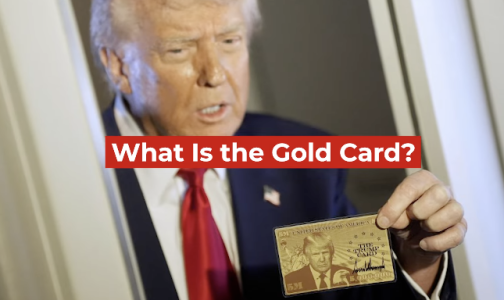A new site opens for Trump’s $5M “gold-card” visa
- Replies 1
If you’ve been following the headlines lately, you might have caught wind of a new, glitzy immigration proposal making waves: the Trump Gold Card Visa.
It’s being touted as a “golden ticket” to US residency—if you have a cool $5 million to spare.
But what’s really behind the fanfare? Is this a game-changer for America’s immigration system or just another political headline?
The idea is simple: attract ultra-wealthy global citizens who are willing to pay a hefty, nonrefundable fee for the privilege of living—and possibly working—in the United States.
In exchange, these “gold card” holders would enjoy a special tax status, paying US taxes only on income earned within the country, not on their worldwide income.
Sound familiar? That’s because it’s reminiscent of so-called “golden visa” programs in places like Portugal, Greece, and the Caribbean, where wealthy investors can buy their way into residency or even citizenship.
But the Trump Gold Card comes with its own American twist—and, as of now, a lot of unanswered questions.

There are also significant fees (between $100,000 and $200,000) and a lengthy vetting process.
The Trump Gold Card, by contrast, is designed for those who want a more straightforward (albeit pricier) path: pay $5 million, skip the job-creation requirement, and enjoy a more favorable tax structure.
According to Ashok Kumar Adusumilli, director of EB5Resources.com, the two programs could coexist, targeting different types of investors.
The EB-5 is for families seeking permanent residency and a return on their investment; the Gold Card is for the ultra-wealthy who want flexibility and don’t mind a nonrefundable fee.
There’s a website—TrumpCard.gov—where you can register your interest, but there’s no official application process, no detailed criteria, and, crucially, no legislation passed by Congress to make it happen.
Changing the US tax code to allow for this kind of territorial tax treatment isn’t something that can be done with the stroke of a pen.
It would require a major overhaul of the Internal Revenue Code and approval from both the House and Senate.
As David Lesperance, an immigration attorney, put it, “No immigration bill introduced, so no product to sell. No tax bill to bring in territorial tax introduced, so no market even if immigration bill becomes law.” In other words, don’t expect to see Gold Card holders moving in next door anytime soon.
Supporters argue that it could bring billions in investment, create jobs, and boost the economy.
Critics worry it sends the wrong message about American values and could open the door to money laundering or other abuses.
It’s also worth noting that the Trump administration has taken a hard line on other forms of immigration, including mass deportations and ending protections for some migrants.
The Gold Card, then, stands out as one of the few 'open doors'—but only for those with deep pockets.
If you sign up, you’ll get a message saying, “You’ll be the first to hear when access opens.” But until Congress acts, the Gold Card remains a concept, not a concrete option.
If you’re curious about the program, keep an eye on the news and official government channels.
And if you’re considering investing, consult with a qualified immigration attorney before making any decisions—especially with so many details still up in the air.
Some have attracted significant foreign investment, while others have faced criticism for a lack of transparency or for enabling tax evasion.
For example, Portugal offers residency for a €500,000 real estate investment, while Greece has a similar program for €250,000. Meanwhile, St. Kitts and Nevis grants citizenship for a $150,000 donation.
These programs are often popular with retirees, businesspeople, and those seeking a “Plan B” passport. But they’re also under increasing scrutiny from regulators and the public.
Also read:

Do you think the US should offer residency to wealthy investors? Would you support a program like the Trump Gold Card if it brought jobs and investment to your community? Or do you worry it could undermine the fairness of our immigration system? Share your thoughts in the comments below.
It’s being touted as a “golden ticket” to US residency—if you have a cool $5 million to spare.
But what’s really behind the fanfare? Is this a game-changer for America’s immigration system or just another political headline?
What Is the Trump Gold Card Visa?
Let’s start with the basics. The Trump Gold Card Visa is a proposed program that would grant US residency to individuals who invest $5 million in the country.The idea is simple: attract ultra-wealthy global citizens who are willing to pay a hefty, nonrefundable fee for the privilege of living—and possibly working—in the United States.
In exchange, these “gold card” holders would enjoy a special tax status, paying US taxes only on income earned within the country, not on their worldwide income.
Sound familiar? That’s because it’s reminiscent of so-called “golden visa” programs in places like Portugal, Greece, and the Caribbean, where wealthy investors can buy their way into residency or even citizenship.
But the Trump Gold Card comes with its own American twist—and, as of now, a lot of unanswered questions.

The Trump Gold Card Visa is a proposed program that would grant US residency to individuals who invest $5 million in the country. Image source: Business Standard / YouTube
How Does It Compare to the EB-5 Visa?
If you’ve heard of the EB-5 visa, you’re not alone. Established in 1990, the EB-5 program allows foreign investors to obtain a green card by investing $800,000 to $1 million in a US business that creates at least 10 jobs for American workers.There are also significant fees (between $100,000 and $200,000) and a lengthy vetting process.
The Trump Gold Card, by contrast, is designed for those who want a more straightforward (albeit pricier) path: pay $5 million, skip the job-creation requirement, and enjoy a more favorable tax structure.
According to Ashok Kumar Adusumilli, director of EB5Resources.com, the two programs could coexist, targeting different types of investors.
The EB-5 is for families seeking permanent residency and a return on their investment; the Gold Card is for the ultra-wealthy who want flexibility and don’t mind a nonrefundable fee.
Is It Real, or Just Political Theater?
Here’s where things get murky. As of now, the Trump Gold Card Visa is more of a proposal than a reality.There’s a website—TrumpCard.gov—where you can register your interest, but there’s no official application process, no detailed criteria, and, crucially, no legislation passed by Congress to make it happen.
Changing the US tax code to allow for this kind of territorial tax treatment isn’t something that can be done with the stroke of a pen.
It would require a major overhaul of the Internal Revenue Code and approval from both the House and Senate.
As David Lesperance, an immigration attorney, put it, “No immigration bill introduced, so no product to sell. No tax bill to bring in territorial tax introduced, so no market even if immigration bill becomes law.” In other words, don’t expect to see Gold Card holders moving in next door anytime soon.
Why Does This Matter?
For many Americans, the idea of selling residency to the highest bidder is controversial.Supporters argue that it could bring billions in investment, create jobs, and boost the economy.
Critics worry it sends the wrong message about American values and could open the door to money laundering or other abuses.
It’s also worth noting that the Trump administration has taken a hard line on other forms of immigration, including mass deportations and ending protections for some migrants.
The Gold Card, then, stands out as one of the few 'open doors'—but only for those with deep pockets.
What’s Next?
For now, the TrumpCard.gov website is collecting names and emails from interested parties—both individuals and businesses.If you sign up, you’ll get a message saying, “You’ll be the first to hear when access opens.” But until Congress acts, the Gold Card remains a concept, not a concrete option.
If you’re curious about the program, keep an eye on the news and official government channels.
And if you’re considering investing, consult with a qualified immigration attorney before making any decisions—especially with so many details still up in the air.
A Broader Look: The Rise of “Golden Visas” Worldwide
The Trump Gold Card isn’t the first program of its kind. Countries around the world have experimented with “golden visas” and “citizenship by investment” schemes, often with mixed results.Some have attracted significant foreign investment, while others have faced criticism for a lack of transparency or for enabling tax evasion.
For example, Portugal offers residency for a €500,000 real estate investment, while Greece has a similar program for €250,000. Meanwhile, St. Kitts and Nevis grants citizenship for a $150,000 donation.
These programs are often popular with retirees, businesspeople, and those seeking a “Plan B” passport. But they’re also under increasing scrutiny from regulators and the public.
Also read:
- Trump launches his "Gold Card" with a familiar flair
- Residency for sale? Trump’s “gold card” plan sparks debate
Key Takeaways
- Donald Trump’s administration has launched a registration website for a proposed '$5 million Gold Card' visa that would grant US residency to individuals investing $5 million in the country.
- The Gold Card visa aims to offer favorable territorial tax treatment—taxing only US-sourced income rather than worldwide income—and may potentially replace or run alongside the existing EB-5 visa program.
- Full details of the scheme are not yet available, as implementing the Gold Card would require major legislative changes that have not yet been introduced in Congress.
- Experts and commentators have noted that, at present, the Gold Card is more of a proposed concept than a functioning program, as significant legal and regulatory steps have yet to be taken.






